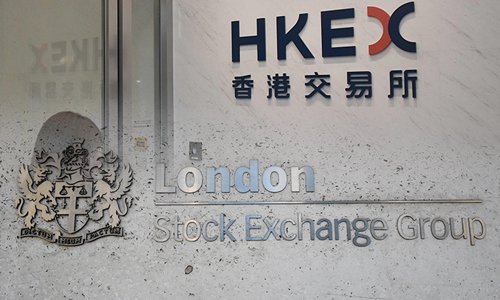HOME >> BUSINESS
Implications for potential merger between HKEX and London Stock Exchange
By Wu Jinduo Source:Global Times Published: 2019/9/12 9:49:14

Photo: VCG
Hong Kong Exchanges and Clearing (HKEX) has made a surprise $36.6 billion offer to merge with the London Stock Exchange (LSE).
London is the global offshore dollar financial center and Hong Kong is the world's leading offshore RMB business center. Together, the two would create an international trading platform connecting the global financial infrastructure, exchange groups and financial assets.
In fact, before this proposal, as early as 2012, after HKEX acquired the London Metal Exchange (LME), HKEX implemented business integration, rebuilt the London Metal Exchange Clear, and reformed the warehousing system, pricing system and risk disclosure system.
On July 28, 2015, the LME said it would accept the yuan as a pledge for banks and brokers to trade on the platform. The yuan became another pledge currency accepted by the LME after the US dollar, the euro, the pound sterling and the Japanese yen. Meanwhile, in 2015, Hong Kong Futures Exchange Limited, Hong Kong Futures Settlement Limited, LME and London Metal Exchange Clear signed a memorandum of cooperation, intending to establish trading links between the Hong Kong Futures Exchange and LME, as well as futures settlement.
Establishing a clearing link between the company and the London Metal Exchange and Settlement Agency. Financial institutions in Hong Kong and London have a long history of in-depth cooperation.
The two exchanges are highly complementary. Specific manifestations are (1) The London Stock Exchange is the global leader in fixed income and currency markets, while the advantages of HKEX lie in stocks, derivatives and IPOs. (2) The London Stock Exchange has the most core liquidation and settlement financial infrastructure in the world, while HKEX has a leading edge in cross-border capital clearing, investment trading and risk management financial infrastructure. (3) The London Stock Exchange has a long history of providing comprehensive and multi-level financial services and products to the most valuable and resourceful companies and investors in mature European and American economies, while HKEX has positioned itself as a global wealth management center based on the Greater Bay Area of Guangdong, Hong Kong and Macao.
In recent years, the development of digital currency has been in full swing. The People's Bank of China, the country's central bank, has been at the forefront of the world in the research and testing stage. The London Stock Exchange has the most advanced index and data analysis ability in the world. HKEX has the data advantage of the huge market in the Chinese mainland. In the future, the two exchanges will be the combination of statutory digital currencies. There is broad scope for cooperation with other types of digital currencies.
The possibility exists for the London Stock Exchange to accept the HKEX merger proposal. According to HKEX's proposal, HKEX trades 2,045 pence in cash plus 2,495 new shares for one share of the London Stock Exchange. The valuation of the London Stock Exchange shares is about 8,361 pence per share, with a 22.9 percent premium on LSE's closing share price on September 10. The weighted average closing price of Refinitiv from July 29, 2019 to September 10, 2019 was 22.4 percent premium to 6,833 pence per share on the first trading day after the first announcement of Refinitiv trading by the London Stock Exchange Group.
At the same time, HKEX plans to list its shares on the London Stock Exchange for the second time when the proposed transaction is completed, which would also be convenient for the UK.
But there are also many challenges and difficulties in merging. The merger of the two exchanges must be approved by the relevant regulatory bodies both in Hong Kong and the UK before it can be implemented. This approval process is difficult to predict. The unification of product categories, operation modes and trading rules and regulations related to the two exchanges have not been clearly stipulated.
The two exchanges will launch cooperative negotiations on related issues, which will require a longer consultation process. The operating mechanism, trading system and investor structure between Hong Kong and London are quite different, and it is not practical to push forward in a short time.
After a merger of the two exchanges, trading volume may not rise rapidly in the early trading period. The convenience of trading currency and the time difference of trading bring inconvenience to members. In addition, how to unify the trading qualifications of the two exchanges has not yet been promulgated.
If the merger of the two exchanges goes ahead, higher requirements would have to be put forward on the rules and law adaptability and transaction risk prevention ability of institutional investment and individuals who have acquired trading qualifications.
The author is head of fixed income at the research institute of Great Wall Securities and a part-time fellow of the Development Research Institute at Fudan University. bizopinion@globaltimes.com.cn
Posted in: EYE ON ECONOMY